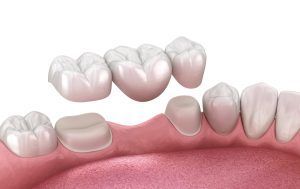Blog

By Westmoreland Dental Group
•
November 27, 2024
What are Dental Bridges? Understanding the Basics If you’ve lost one or more teeth, you may be considering your options for restoring your smile. One popular solution is a dental bridge. But what exactly are dental bridges, and how do they work? In this blog post, we’ll explore the basics of dental bridges, including their […]
The post What are Dental Bridges? Understanding the Basics appeared first on J.D. "Bo" Westmoreland, D.D.S..

By Westmoreland Dental Group
•
November 20, 2024
Dental Hygiene Tips for Busy Holiday Schedules The holiday season is a time filled with joy, celebration, and family gatherings. However, with all the hustle and bustle, it can be easy to let your dental hygiene slip through the cracks. Maintaining good oral health is crucial, especially during this busy time of year. Here are […]
The post Dental Hygiene Tips for Busy Holiday Schedules appeared first on J.D. "Bo" Westmoreland, D.D.S..

By Westmoreland Dental Group
•
November 13, 2024
How Stress Affects Your Oral Health During the Holiday Season The holiday season is often filled with joy, celebration, and family gatherings. However, it can also bring an overwhelming amount of stress. Researchers have determined that stress can lead to or exacerbate a number of oral health problems. Understanding how stress affects your mouth can help you manage […]
The post How Stress Affects Your Oral Health During the Holiday Season appeared first on J.D. "Bo" Westmoreland, D.D.S..

By Westmoreland Dental Group
•
November 6, 2024
Should you wait until after the holidays for dental work? As the holidays approach, it’s tempting to put off dental work until January. With busy schedules, travel plans, and holiday expenses, delaying seems like the easy option. But before you wait, consider these reasons why handling your dental work now could benefit you throughout the […]
The post Should You Wait Until After the Holidays for Dental Work? appeared first on J.D. "Bo" Westmoreland, D.D.S..

By Westmoreland Dental Group
•
October 29, 2024
Lumineers and Teeth Sensitivity: What to Expect Lumineers are a popular cosmetic dentistry treatment that can dramatically improve the appearance of your smile. However, like any other dental procedure, they can sometimes cause temporary sensitivity. Understanding what to expect and how to manage any discomfort is essential for a positive experience. Why Do Lumineers Sometimes […]
The post Lumineers and Teeth Sensitivity: What to Expect appeared first on J.D. "Bo" Westmoreland, D.D.S..

By Westmoreland Dental Group
•
October 22, 2024
A Root Canal: The Guide to Saving Your Teeth Root canals, also known as endodontic treatment, are a common dental procedure that can save a tooth from extraction. When the tooth’s pulp, the soft tissue inside the tooth, becomes infected or damaged, a root canal is often necessary. At Westmoreland Dental Group in Johnson City, […]
The post A Root Canal: The Guide to Saving Your Teeth appeared first on J.D. "Bo" Westmoreland, D.D.S..

By Westmoreland Dental Group
•
October 15, 2024
Invisalign: The Clear Choice for a Straight Smile Clear aligners, also known as Invisalign, are a revolutionary orthodontic treatment that has helped millions of people achieve the straight, beautiful smiles they’ve always dreamed of. At Westmoreland Dental Group in Johnson City, TN, we’re proud to offer Invisalign to our patients as a discreet and effective […]
The post Invisalign: The Clear Choice for a Straight Smile appeared first on J.D. "Bo" Westmoreland, D.D.S..

By Westmoreland Dental Group
•
October 8, 2024
October is National Orthodontic Health Month! How TMJ Treatment Can Align Your Bite and Your Life at Westmoreland Dental Group October is National Orthodontic Health Month, a time to celebrate the importance of healthy smiles and straight teeth. But did you know that orthodontic treatment can also play a crucial role in managing temporomandibular joint […]
The post October is National Orthodontic Health Month appeared first on J.D. "Bo" Westmoreland, D.D.S..
By Westmoreland Dental Group
•
September 25, 2024
When you think about a visit to Westmoreland Dental Group, you might focus on keeping your teeth clean and your smile bright. But did you know that dental checkups are crucial for your health? Let’s explore why those twice-yearly visits to your dentist are more important than you might realize. The Mouth-Body Connection Your mouth […]
The post Dental Checkups Are Crucial for Your Overall Health appeared first on J.D. "Bo" Westmoreland, D.D.S..
By Westmoreland Dental Group
•
September 18, 2024
Are you among the millions of Americans without private dental insurance? At Westmoreland Dental Group, we believe that quality dental care should be accessible to everyone. That’s why we’re excited to introduce our Smart Smiles Savings Plan – a budget-friendly alternative to traditional dental insurance that puts comprehensive oral health within reach. What is the […]
The post What’s a Smart Smiles Savings Plan? appeared first on J.D. "Bo" Westmoreland, D.D.S..

